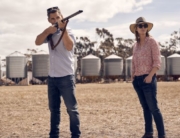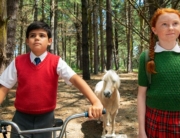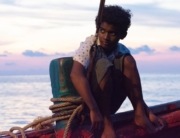Wish You Were Here opens with some beautiful images of Aussies doing what Aussies do so well, namely, being blond and tanned, charismatic and carousing. It helps that among their number are the remarkably attractive pair of Joel Edgerton and Teresa Palmer, as well as Felicity Price (one of the film’s writers) in a soulful, winning role. They traipse through a small town in Cambodia with an easy-breezy tourism that is both infectious and more than a little discomfiting. It’s too postcard-perfect to be sustainable, and though you don’t know when or where the other shoe will drop, there’s never any doubt that eventually someone will have to pay the price for this euphoria.
As soon as the opening blast of sun and summer has settled to a standstill, and our protagonists are back home in Sydney, director Kiernan Darcy-Smith and editor Jason Ballantine begin to drop small hints of the problems to come: Dave (Edgerton) wanders along a beach, dazed and bloody; wife Alice (Price) participates in hushed phone calls with her sister Steph (Palmer) that end abruptly. We quickly learn that one of their friends, a freewheeling businessman played by Antony Starr, has disappeared without a trace.
The details of this mystery begin to unfold with a pleasant sense of portentousness, leavening the omnipresent sunshine with a potent dose of melancholy. Things that seemed charming moments before—the chaos of a large, healthy family, or the closeness of two sisters—turn sharp and grating when framed in this new, harsher context. When an affair is revealed—a plot point executed with enough subtlety and taste that you don’t mind its predictability—another mystery is superimposed on the first, and Alice’s world goes to pieces.
Price, a charismatic actress, exhibits warmth and an easy, unforced performance that is involving and compelling. But as the story progresses, she is forced into a reactive postures, those more typically inhabited by on-screen women (deceived spouse, responsible parent), and her character and the story both lose some credibility. What seemed at first like a riddle for us to unravel turns instead into an answer that needs to be revealed, and the film doles out the information carefully and somewhat frustratingly. It’s something of a truism that a solution is often less interesting than a question, and as what is dark begins to come to light, the film’s initial moments remain its strongest.
The elliptical editing, which peppers the present narrative with flashbacks to Cambodia, feels more and more like a tic as the story moves on. These reminiscences center on Edgerton’s character, which gives him a welcome chance to fill the screen. He is a remarkable presence, with hints of darkness and violence continually threatening to crumble his affable masculinity from within. He also benefits from being the actor with the most to do on screen; Palmer’s scenes almost consist exclusively of her either laughing or crying.
The proceedings are shot by Jules O’Loughlin in a pretty, glossy style that seduces before it repels. This shiny, polished world and the colored gleams of light that thread their way through the camera’s lens are both inviting and ominous, a suggestion that this world is too good to be true. It’s this moodiness that lingers after the film has ended, one that goes so much deeper than the idyllic surfaces of Sydney seem to allow. Every so often, an expressionistic touch brings this darkness to the fore, promising a world of feeling that is never quite delivered.







Leave A Comment